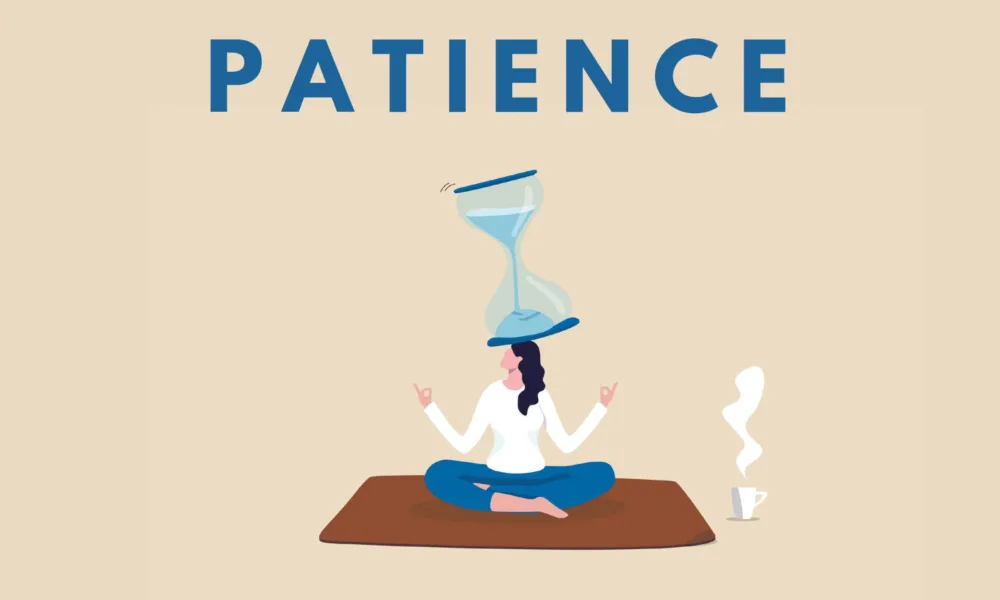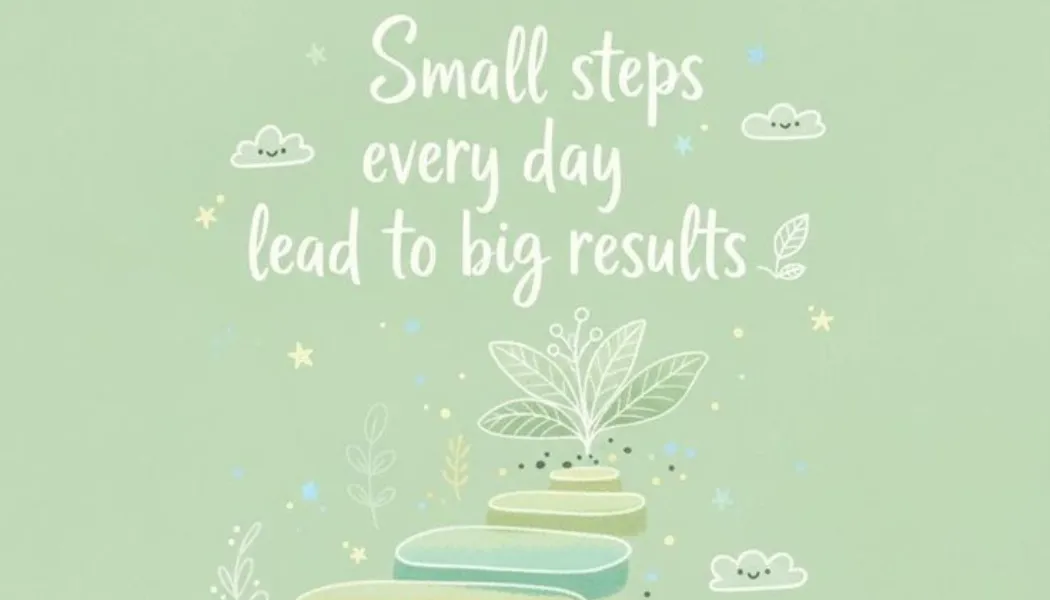Small steps every day lead to big results
In a world obsessed with instant results, overnight success stories, and viral transformations, we often forget that the most meaningful achievements rarely happen overnight. Behind every major accomplishment lies a series of tiny, consistent actions—small steps taken with purpose and persistence. Whether it’s learning a new skill, healing from loss, improving health, or building a career, real progress unfolds gradually.
In a world obsessed with instant results, overnight success stories, and viral transformations, we often forget that the most meaningful achievements rarely happen overnight. Behind every major accomplishment lies a series of tiny, consistent actions—small steps taken with purpose and persistence. Whether it’s learning a new skill, healing from loss, improving health, or building a career, real progress unfolds gradually.
The phrase “Small steps every day lead to big results” reminds us that steady effort, even when it feels insignificant, builds unstoppable momentum. Each little step—every morning jog, every page read, every kind word spoken—accumulates into something far greater than the sum of its parts. This article explores how embracing small daily actions can transform your life, reshape your mindset, and help you achieve the goals that once felt out of reach.
Table of contents
- The Myth of Overnight Success
- Why Small Steps Matter More Than Giant Leaps
- The Science Behind Incremental Progress
- The Ripple Effect of Small Actions
- Real-Life Examples of the Small Steps Principle
- Building Momentum: The Power of Daily Effort
- How to Apply the “Small Steps” Mindset in Daily Life
- Patience: The Bridge Between Effort and Reward
- When Progress Feels Invisible
- Breaking Down Big Goals into Manageable Steps
- Consistency Over Perfection
- Small Steps in Times of Challenge
- The Compound Effect: How Tiny Efforts Create Massive Results
- Stories from Nature: Lessons in Gradual Growth
- Mindset Shift: From “All or Nothing” to “Always Something”
- Celebrating Micro-Wins
- How Small Steps Strengthen Character
- When Big Results Finally Arrive
- Your Next Step Starts Now
- Conclusion: Big Results Are Built, Not Born
The Myth of Overnight Success
Social media often showcases the highlight reels of success. We see the best-selling author, the viral influencer, or the successful entrepreneur—but rarely the years of struggle behind them. This illusion of overnight success can be demotivating. It creates unrealistic expectations and makes steady, incremental progress seem unworthy of celebration.
Yet, if we look closer, every great story has humble beginnings. The best-selling author once stared at a blank page. The athlete once struggled to finish a single lap. The successful business owner once doubted every decision. What separates them from those who give up is not extraordinary talent, but consistent effort over time.
Big results are the visible tip of an iceberg—the part that glimmers in the sunlight. But beneath the surface lies a massive foundation built by countless small, unseen efforts. Without that base, success simply cannot stand.
Why Small Steps Matter More Than Giant Leaps
When you take small, manageable steps toward a goal, you reduce the psychological resistance that often accompanies big changes. Think about New Year’s resolutions—most people fail not because they lack discipline, but because they try to change everything at once. A drastic shift can overwhelm the mind, trigger self-doubt, and lead to burnout.
Small steps, on the other hand, are sustainable. They work with your natural rhythm rather than against it.
Here’s why they’re so powerful:
- They build momentum. Every small win releases a sense of accomplishment, encouraging you to keep going.
- They reduce fear. A small action feels less risky, so you’re more likely to take it.
- They create habits. Repetition solidifies behavior into routine.
- They teach patience. You learn to value growth, not just outcomes.
- They strengthen confidence. Each completed step reinforces your belief in yourself.
Progress isn’t linear—it’s often slow, uneven, and filled with setbacks. But by focusing on daily effort rather than distant results, you keep moving forward even when motivation fades.
The Science Behind Incremental Progress
Psychologists and neuroscientists agree: small, consistent actions reshape the brain through a process called neuroplasticity. Every time you repeat a behavior, your brain strengthens the neural pathways associated with it. Over time, this rewiring makes the behavior automatic—turning effort into ease.
James Clear, author of Atomic Habits, puts it beautifully: “You do not rise to the level of your goals; you fall to the level of your systems.”
In other words, success isn’t about setting huge goals—it’s about designing daily habits that move you closer to them.
Even a 1% improvement each day leads to profound transformation over time. Compounded, that small daily effort equals exponential growth. Mathematically, improving just 1% per day means you’ll be 37 times better after a year. That’s the quiet magic of consistency.
The Ripple Effect of Small Actions
Imagine dropping a pebble into a still pond. The ripples spread outward, touching every corner. Small actions work the same way—they create effects beyond what you can see.
For example:
- Saying “thank you” to a colleague can lift their mood, inspiring them to treat someone else kindly.
- Spending 10 minutes meditating daily can ripple into clearer thinking, better decisions, and healthier relationships.
- Choosing to walk instead of drive can improve your health, reduce emissions, and influence others to live more sustainably.
These small acts accumulate into something meaningful. Over time, they shape not only your personal growth but also the world around you.
Real-Life Examples of the Small Steps Principle
1. The Marathon Runner Who Started with a Single Step
Many marathon runners didn’t begin by running 26 miles. They started with one—sometimes even half. Step by step, their endurance built, their lungs strengthened, and their confidence grew. The first run wasn’t glorious, but it was the spark that lit the journey.
2. The Author Who Wrote One Page a Day
Stephen King, one of the most prolific writers in history, famously writes 1,000 words a day—no more, no less. That routine produces an entire book in just a few months. He doesn’t chase perfection daily; he simply shows up consistently.
3. The Parent Who Chose Daily Connection
A parent who spends just ten uninterrupted minutes talking or playing with their child each day fosters trust, love, and lifelong connection. Over time, those minutes shape memories that matter far more than grand gestures.
4. The Entrepreneur Who Focused on One Improvement a Week
Instead of trying to revolutionize their business overnight, one small business owner decided to improve one process every week—whether it was customer service, packaging, or communication. After a year, the cumulative effect was a complete transformation.
These stories show that greatness is built gradually. Each step, no matter how small, is a brick in the foundation of success.
Building Momentum: The Power of Daily Effort
When you take one small step and succeed, even slightly, you generate momentum—the psychological equivalent of forward motion. Momentum fuels motivation, and motivation fuels further action.
This cycle—called the “success spiral”—turns effort into energy. It’s why people who start exercising a few minutes a day often end up running marathons, or why writing a short journal entry can evolve into publishing a book. The initial step is the hardest, but it opens the door to continuous growth.
The secret? Start small, but start now.
How to Apply the “Small Steps” Mindset in Daily Life
Let’s explore how you can apply this philosophy across different areas of your life:
1. Personal Growth
- Read 5 pages of a book each night.
- Journal one sentence about what you’re grateful for.
- Spend 2 minutes in silence each morning before checking your phone.
2. Health and Fitness
- Start with 10-minute walks instead of an hour-long workout.
- Replace one sugary drink with water each day.
- Go to bed 15 minutes earlier tonight.
3. Career and Learning
- Learn one new skill or concept daily.
- Send one networking email a week.
- Dedicate 15 minutes to deep work before opening your inbox.
4. Relationships
- Compliment someone genuinely.
- Listen more than you speak in one conversation.
- Send a message to reconnect with an old friend.
Each small act might seem too minor to matter—but together, they create a ripple of growth and connection that transforms your life.
Patience: The Bridge Between Effort and Reward
The challenge with small steps is that results take time. In a world built on instant gratification, waiting for growth can be frustrating. But patience is the bridge between where you are and where you want to be.

Imagine planting a seed. You water it daily, but nothing seems to happen at first. Weeks later, a small sprout appears. Months later, it blooms. Without patience, you might have stopped watering it—just before it grew.
The same applies to life goals. Trust the process, even when results are invisible. Growth is happening beneath the surface.
When Progress Feels Invisible
There will be days when your small steps feel pointless. You’ll ask yourself, “Is this even working?” That’s when consistency matters most.
Progress often hides in subtle changes:
- You react more calmly than before.
- You feel less exhausted doing the same task.
- You understand concepts that once confused you.
These micro-improvements are invisible markers of transformation. Over time, they accumulate until one day, you realize—you’ve changed.
Breaking Down Big Goals into Manageable Steps
Big goals can be intimidating, but breaking them down makes them achievable. Here’s a simple approach:
- Define the destination. Be clear about what you want to achieve.
- Divide the goal. Break it into smaller tasks or phases.
- Decide the frequency. Choose a daily or weekly action.
- Track progress. Celebrate milestones, no matter how small.
- Adjust when needed. Flexibility is part of consistency.
Example:
If your goal is to run a 10K, your plan might look like:
- Week 1: Walk 15 minutes daily.
- Week 2: Jog for 5 minutes, walk 10.
- Week 4: Run 1 km without stopping.
- Week 8: Run 5 km.
- Week 12: Complete the full 10K.
You’re not racing others—you’re building your own rhythm.
Consistency Over Perfection
Perfectionism is the enemy of progress. When we aim to be perfect, we often procrastinate out of fear of failure. But consistency doesn’t demand perfection—it asks only for persistence.
Some days, your step might be smaller than usual. That’s okay. The goal is to keep moving forward, even imperfectly.
A missed day isn’t failure—it’s feedback. Learn from it, realign, and begin again tomorrow. Remember: growth is forgiving.
Small Steps in Times of Challenge
During hard times—grief, burnout, or uncertainty—taking big actions may feel impossible. That’s when small steps become survival tools.

- When you can’t run, walk.
- When you can’t walk, rest.
- When you can’t move forward, simply breathe.
Even the smallest act—like getting out of bed, writing one sentence, or smiling once—counts as progress. Healing and resilience are built one small moment at a time.
The Compound Effect: How Tiny Efforts Create Massive Results
The compound effect describes how small actions multiply over time. Just like money grows with compound interest, effort compounds through repetition.
Here’s the beauty of it:
- Reading 10 pages a day = 3,650 pages a year = about 12 books.
- Saving ₹100 a day = ₹36,500 a year = an emergency fund.
- Doing 10 push-ups daily = 3,650 push-ups a year = stronger muscles and discipline.
Each daily act may seem small, but over months and years, it transforms your life trajectory.
Stories from Nature: Lessons in Gradual Growth
Nature itself thrives on the principle of small, steady progress.
- A river doesn’t carve valleys in a day—it shapes landscapes drop by drop.
- A tree doesn’t reach the sky overnight—it grows ring by ring, season by season.
- A butterfly doesn’t emerge in an instant—it transforms slowly inside its cocoon.
If nature honors gradual growth, why should we rush ours? Every living thing takes time to bloom. So will you.
Mindset Shift: From “All or Nothing” to “Always Something”
Many people fall into the trap of “all or nothing” thinking—believing that if they can’t give 100%, they might as well give 0%. But true growth thrives in the mindset of “always something.”
Even on your worst days, doing something—however small—keeps your progress alive.
Didn’t make it to the gym? Stretch for five minutes.
Didn’t finish your project? Work on it for ten minutes.
Didn’t meditate? Take three deep breaths.
Progress, not perfection, is the goal.
Celebrating Micro-Wins
Every step forward deserves recognition. Celebrating small wins boosts dopamine, reinforcing your motivation to continue. You can celebrate by:
- Writing down your achievements.
- Rewarding yourself with rest or gratitude.
- Sharing your progress with supportive people.
Acknowledging progress is not arrogance—it’s fuel for your journey.
How Small Steps Strengthen Character
Beyond results, daily effort shapes who you become. It cultivates discipline, humility, and resilience. You learn to trust yourself—to follow through on promises even when it’s hard.
Each small step whispers a truth: You are capable.
With every repetition, that whisper grows louder until it becomes unshakable belief.
The results matter, but the person you become along the way matters more.
When Big Results Finally Arrive

One day, without realizing it, you’ll look back and see how far you’ve come. The small steps that once felt trivial will have built the foundation of your success. You’ll notice that your habits changed quietly, your confidence grew naturally, and your dreams began to take shape almost effortlessly.
You’ll realize that success didn’t come from one grand leap—it came from the courage to take small ones, every single day.
Your Next Step Starts Now
Ask yourself: What’s one small step I can take today?
It could be as simple as drinking more water, sending a thank-you note, meditating for a minute, or planning tomorrow’s priorities. Don’t wait for the perfect time or mood—the act of beginning creates its own motivation.
As the old proverb says, “The journey of a thousand miles begins with a single step.”
Take that step. Then another. And another. Soon, those steps will carry you to places you never imagined.
Conclusion: Big Results Are Built, Not Born
Life isn’t about giant leaps—it’s about gentle persistence. It’s about showing up when no one’s watching, trusting the invisible process, and believing that small efforts compound into greatness.
Every time you take a small step, you invest in your future self. You prove that change is possible—not because you moved mountains today, but because you had the courage to move a single pebble.
So keep walking, one step at a time. You’re already on your way to something beautiful.
Stay Inspired on Your Growth Journey
If this reminder sparked something in you — that quiet belief that progress is built one small step at a time — here are a few more reads to keep you motivated, grounded, and growing day by day:
- The Power of Habits: How Tiny Changes Create Lasting Transformation – Discover how small daily shifts can lead to massive personal growth.
- Empower Your Growth: A Comprehensive Guide to Personal Development – Explore how intentional self-improvement opens doors to new possibilities.
- Strategies for Growth and Resilience – Learn how persistence turns challenges into stepping stones for success.
- The Art of Consistency: Why Showing Up Matters More Than Being Perfect – Find motivation in the everyday act of trying again.
- The 30-Day Mindfulness Challenge: Transforming Your Daily Life – Take small, meaningful steps toward balance and calm — one mindful moment at a time.
The Positivity Collective
The Positivity Collective is a dedicated group of curators and seekers committed to the art of evidence-based optimism. We believe that perspective is a skill, and our mission is to filter through the noise to bring you the most empowering wisdom for a vibrant life. While we are not clinical professionals, we are lifelong students of human growth, devoted to building this sanctuary for the world.
